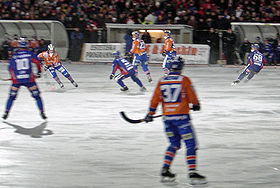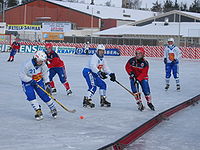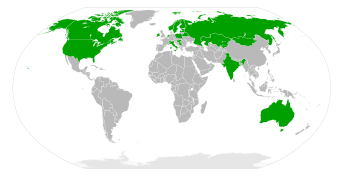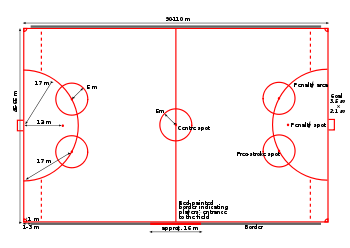- Bandy
-
 Pour les articles homonymes, voir Bandy (homonymie).
Pour les articles homonymes, voir Bandy (homonymie).Bandy Fédération internationale FIB (fondée en 1955) Autres appellations Hockey russe Principale instance championnats du monde (1957) Champion(ne)(s) du monde en titre 
 Russie
Russie

 Suède
Suèdemodifier 
Le bandy (hockey russe) est un sport collectif, ancêtre du hockey sur glace. Le bandy se pratique sur des terrains de football gelés. Chaque équipe compte onze joueurs sur le terrain. Les joueurs munis de patins se disputent à l'aide d'une crosse une petite balle de liège de couleur orange. Le système du hors-jeu est similaire à celui en usage en football. La partie dure deux fois quarante-cinq minutes avec une pause d'un quart d'heure entre les deux périodes. Le gardien arrête les tirs à mains nues.
Sommaire
Histoire
Le bandy est une forme de hockey sur glace jouée sur des « champs de glace » aux Pays-Bas dès le XVIe siècle, probablement avant. Certainement importé en Angleterre[1] par les Hollandais, on y trouve trace du bandy au XVIIe siècle[2] . Cette pratique populaire et informelle laissa fort peu de traces.
Dès le XIXe siècle, le jeu s'organise en Angleterre avec la mise en place d'une fédération (1891), d'un règlement unifié et de compétitions. À la fin du XIXe siècle, le bandy est exporté avec succès dans toute l'Europe de Nord et la Russie. Il est ainsi introduit en Suède en 1894[réf. nécessaire].
La Fédération internationale de bandy est fondée le 12 février 1955 avec la participation de quatre fédérations nationales : Union soviétique, Finlande, Suède[3] et Norvège. Un championnat du monde est mis en place à partir de 1957. Aujourd'hui, 27 fédérations nationales sont affiliées :
Pays Année Fédération nationale Lien Note  Argentine
Argentine2008 Bandy Federation of Argentine  Arménie
Arménie2008 Armenian National Federation of Bandy  Australie
Australie2006 Australian Bandy Federation  Biélorussie
Biélorussie1999 Belarusian Bandy Federation  Canada
Canada1986 Canada Bandy [1]  Chine
Chine2010 Chinese Ice Hockey Association  Angleterre
Angleterre2010 Bandy Federation of England  Estonie
Estonie2002 Eesti Jääpalliliit [2]  Finlande
Finlande1955 Suomen Jääpalloliitto [3] Membre fondateur  Hongrie
Hongrie1988 Magyar Bandy Szövetség [4]  Inde
Inde2002 Bandy Federation of India  Irlande
Irlande2006 Bandy Federation of Ireland  Italie
Italie2003 Federazione Italiana Bandy  Japon
Japon2011 Japan Bandy Federation  Kazakhstan
Kazakhstan1994 Kazakhstan Bandy Federation  Kirghizistan
Kirghizistan2004 Bandy Federation of Kyrgyzstan  Lettonie
Lettonie2006 Latvijas Bendija Federācija [5]  Lituanie
Lituanie2008 Lithuanian Bandy Association  Mongolie
Mongolie2002 Bandy Federation of Mongolia  Pays-Bas
Pays-Bas1973 Nederlandse Roller sports en Bandy Bond [6]  Norvège
Norvège1955 Norges Bandyforbund [7] Membre fondateur  Pologne
Pologne2005 Bandy Federation of Poland  Russie
Russie1992 All Russian bandy federation [8] Remplace l'URSS (Membre fondateur)  Serbie
Serbie2006 Bandy Federation of Serbia  Suède
Suède1955 Svenska Bandyförbundet [9] Membre fondateur  Suisse
Suisse2006 The Bandy Federation of Switzerland  Ukraine
Ukraine2008 Ukrainian Bandy and Rinkbandy Federation [10]  États-Unis
États-Unis1981 American Bandy Association [11] Le bandy fut un sport de démonstration aux Jeux olympiques d'hiver de 1952 à Oslo.
Compétitions
Championnats du monde
- Championnat du monde de bandy
- Championnat du monde de bandy 2007
- Championnat du monde de bandy féminin 2007
Autres compétitions
Notes et références
- (fr)Origines et évolution du Hockey sur www.prohockeyfr.com. Consulté le 28 octobre2010.
- (fr)Le Bandy, ancêtre du Hockey sur glace sur www.bloc.com. Consulté le 28 octobre2010.
- (fr)Bandy : le hockey sur glace suédois sur www.cafebabel.fr. Consulté le 28 octobre2010.
Lien externe
- (en) site officiel de la Fédération internationale de bandy
- Fédération de Suisse:[12]
Wikimedia Foundation. 2010.






